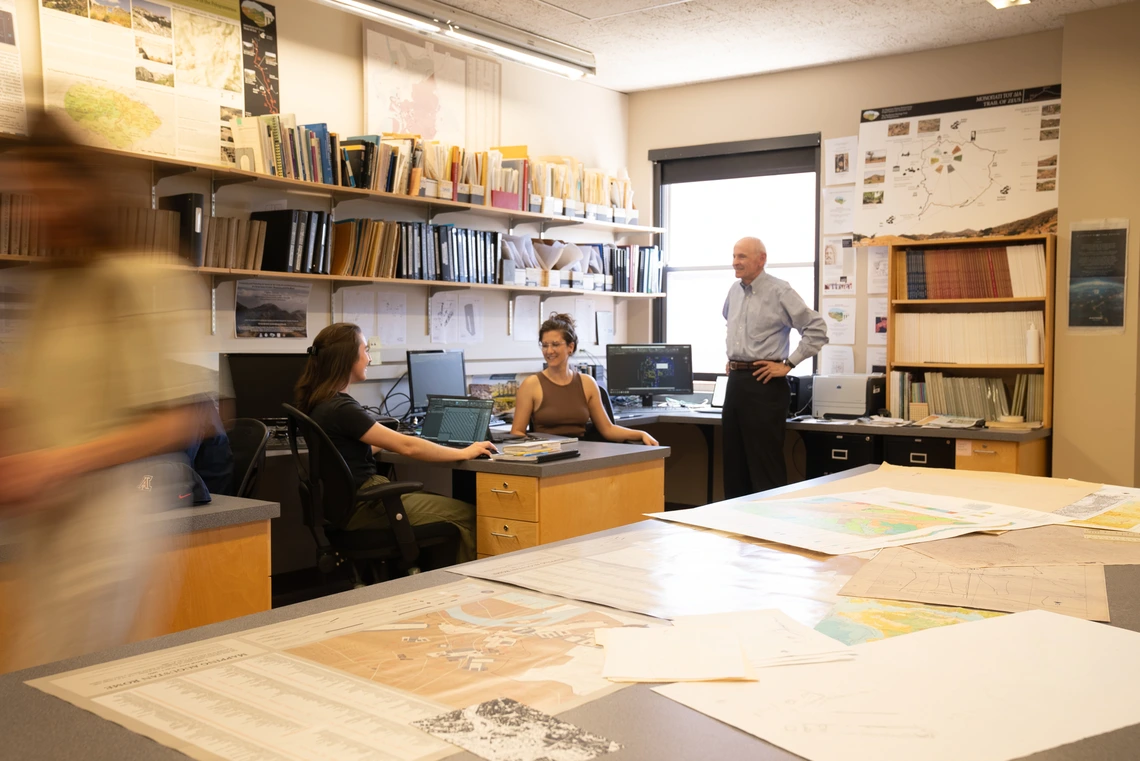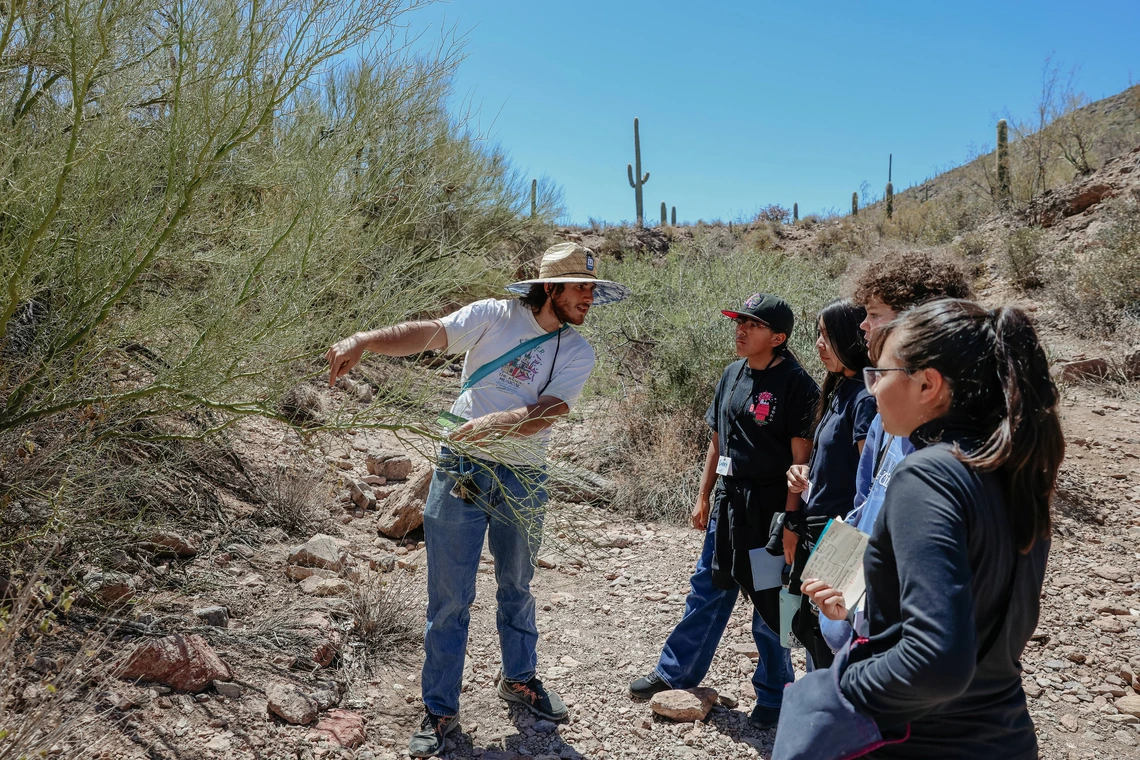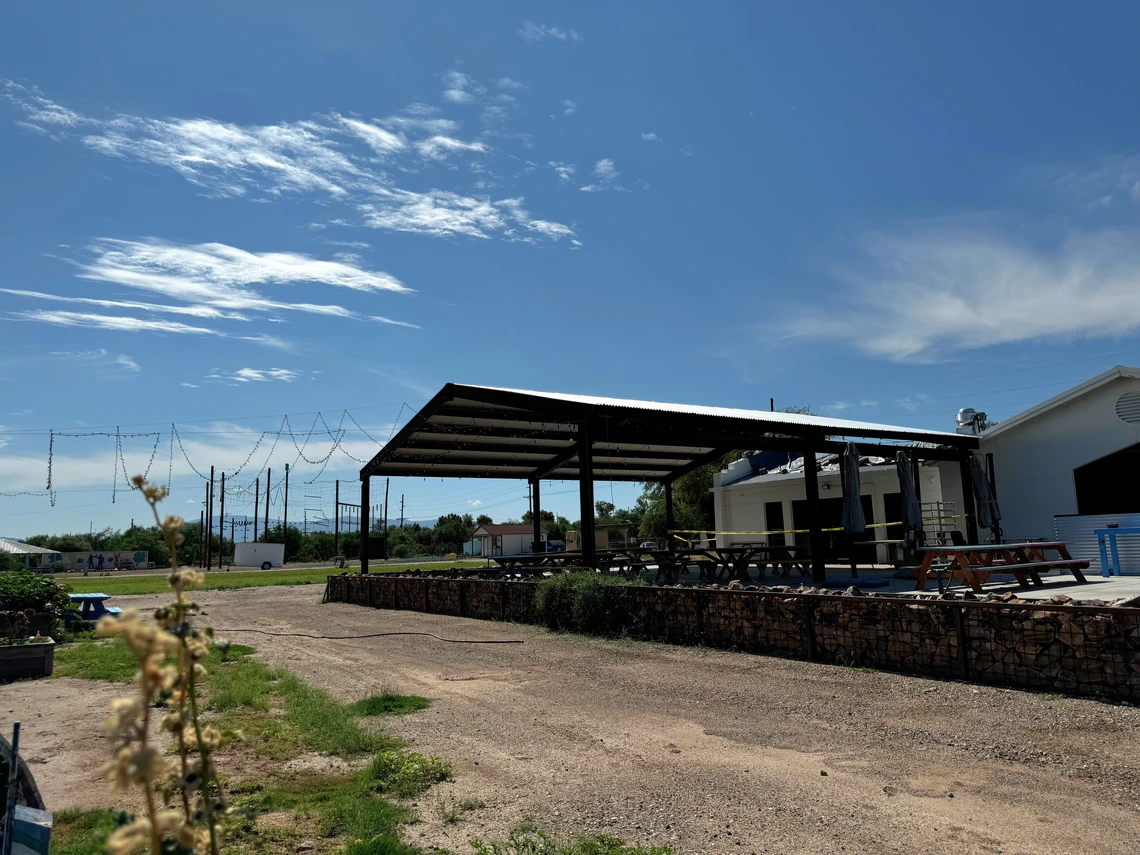Seven sustainability projects with impact: Learn about the new Campus Sustainability Fund Annual Grant awards that are taking off this semester!
Learn about the grant recipients who turned ideas into innovation at the University of Arizona.

From outdoor education and urban farm infrastructure to hydronic innovation and rainwater collection, the seven latest recipients of the Campus Sustainability Fund’s Annual Grant will tackle urgent sustainability challenges with real-world impacts and community-driven solutions! These projects foster interdisciplinary collaborations between faculty and students, advance research and community knowledge, and drive our journey towards a more resilient future. The Campus Sustainability Fund is proud to provide $394,100 for these efforts over the next three years.
Congratulations to the 2025 Annual Grant recipients!
Green Infrastructure Leadership and Engagement
Awarded Amount: $15,300 (Year 1), $14,900 (Year 2), and $15,600 (Year 3)
Department: College of Architecture, Planning, and Landscape Architecture
Project Managers: Ashley Danforth and Xavier Fernandez
Project Adviser: Dr. Bo Yang
Strengthening Sustainability Data Infrastructure
Awarded Amount: $74,400
Department: Facilities and Planning
Project Managers: Trevor Ledbetter and CJ Agbannawag
Environmental Learning Experiences for Undergrads
Awarded Amount: $16,600 (Year 1) and $16,600 (Year 2)
Department: Teaching, Learning, and Sociocultural Studies
Project Manager: Colin Waite and Mariah Kuehl
Climate Change-Mitigating Shade Structures
Awarded Amount: $42,900
Department: Pima County Cooperative Extension
Project Managers: Thomas Plasse and Alexandra Atkin
Seeds of Resilience Courtyard
Awarded Amount: $99,900
Department: Office of the Provost
Project Managers: Marnesha Jones and Jordan Christian
Project Advisor: Chris Stebe
Forms of Rio Tinto
Awarded Amount: $9,700
Department: College of Engineering
Project Manager: Cynthia Navarro and Alexa Armstrong
Project Advisor: Dr. Hee-Jeong Kim
Fungi Blocks for Fresh Crops
Awarded Amount: $88,200
Department: Biosystems Engineering
Project Manager: Triston Hooks and Bree Gomez

Project managers Triston Hooks and Bree Gomez pose with committee member Gabby Nkeze in their greenhouse
Several of the funded projects focus on improving infrastructure data and advancing education surrounding its application. The Green Infrastructure Leadership and Engagement project is looking to launch the first campus-wide database of existing Green Stormwater Infrastructure (GSI). The Green Infrastructure Leadership and Engagement project is led by Ashley Danforth and Xavier Fernandez from the College of Architecture, Planning, and Landscape Architecture, and the project was awarded a total of $45,800 over three years (FY2026–FY2028).
Ashley Danforth shared that she is most excited about “further expanding my knowledge and technical understanding of green stormwater infrastructure (GSI) and getting to develop this 3-year project as a team. This is an extensive initiative that requires us to measure, and 3D model GSI features across the whole UA campus... It has been really exciting to see our student team in action.” Danforth added that “This is my first time navigating a grant proposal process, and the Campus Sustainability Fund (CSF) committee has not only made this an incredibly welcoming experience but has also provided us with strong guiding support along the way. CSF has helped us to think critically about how to achieve our goals, and through this process, I feel we have been able to learn from them on how to thoughtfully shape our vision, refine our strategies, and assess the effectiveness of our work.” Led by a mix of faculty, staff, and student managers, this initiative embodies the University’s strategic imperatives of strengthening collaboration with faculty and students and providing interdisciplinary and leadership opportunities.
The Office of Sustainability’s project, Strengthening Sustainability Data Infrastructure seeks to address critical data gaps in sustainability data to support informed decision-making that will advance institutional sustainability. Strengthening Sustainability Data Infrastructure is led by Trevor Ledbetter and CJ Agbannawag, and the project was awarded $74,400 for FY2026.
Both projects will directly engage student employees with collecting data and monitoring them, resulting in interactive databases and dashboards that can be accessible and available for use in university classes!

Image of SBS Mapping Lab
Switching gears from data, the team at the Cooper Center for Environmental Learning (Cooper Center), led by Colin Waite and Mariah Kuehl, has an exciting education-focused project that will directly engage U of A students with opportunities to work closely with Cooper Center’s full-time educators. Here, students will gain valuable experiences teaching and engaging with students in the Southern Arizona community. Awarded $16,600 for both FY2026 and FY2027, Camp Cooper: Environmental Learning Experiences for Undergraduates will support student-centered experiences that empower interns to work directly with Southern Arizona schools and Cooper Center’s Pre K-12 program to create immersive activities that foster a love for the Sonoran Desert.

Camp Cooper student worker educates students about native desert plants
While these projects center on data and education, other awarded projects seek to improve community spaces.
Climate Change- Mitigating Shade Structures was awarded $42,900 to support the Tucson Village Farm’s mission in educating youth about agriculture and nutrition. Managed by Thomas Plasse and Alexandra Atkin, the team will purchase shade structures to be installed over their field rows and alongside their greenhouse that will increase food production, reduce water usage, and provide a more inviting environment for community members to learn more about sustainable food cultivation.
On campus, the Seeds of Resilience Courtyard’s project team is leading an initiative to create a sustainable community space in the MLK Jr. building courtyard. Led by Marnesha Jones and Jordan Christian under the Office of the Provost, this project was awarded $99,900 to reimagine the courtyard to “reflect the energy, innovation, and joy that radiates from within.” The project will create a seating area and garden with active and passive rainwater harvesting. Once completed, this space will be used by students as a place to relax, learn, and garden.
Both of these projects seek to make improvements to community spaces that will provide more opportunities to educate a wider audience on sustainable solutions while creating comfortable and enjoyable environments.

Existing shade structure on Tucson Village Farm
The next two projects focus on researching innovative ways to minimize and reuse waste! Both projects focus on reusing waste for a new purpose and provide meaningful opportunities for student leadership and involvement.
The Forms of Rio Tinto project led by Cynthia Navarro and Alexa Armstrong from the College of Engineering are exploring ways to use mine waste and bacteria in concrete mixing to create a more sustainable concrete form to use in furniture fabrication. Forms of Rio Tinto was awarded $9,700 to pursue their research and create lounge chairs and planters for a permanent installation near the College of Engineering’s building, providing a community space for students that doubles as a way to inform more people about their research.
Meanwhile, Fungi Blocks for Fresh Crops, led by Triston Hooks and Bree Gomez from Biosystems Engineering, is creating a novel way to use agriculture waste to create mushroom substrates that will replace traditional single-use rockwool. This project team was awarded $88,200 to support their efforts to hire seven student employees. Tours and workshops at the Teaching Greenhouse will extend the reach and impact of their innovative growing techniques to the wider Tucson community!
Project manager Bree Gomez stated she was excited that this project takes a new approach to hydroponic production which helps bring crops into dense urban spaces, and that “this project not only supports those benefits of hydroponic systems but also tackles one of its drawbacks: reliance on single-use materials that end up in landfills or materials that are shipped around the world.” Gomez also said that “So far, CSF has supported and enabled a unique collaboration between the Mycology Lab and the Teaching Greenhouse that has integrated people, facilities, and expertise together in an exciting way that we hope will last even beyond this project. Already, this project has achieved the first set of fungi blocks currently growing pumpkin and tomato plants thereby reducing cost, international shipping, and waste of traditional substrate material. We plan to continue both Fall and Spring semester to achieve more sustainable substrate, more plant production, and lots of fresh produce to harvest and share with the University, local Tucson community, and beyond!”
Together, these projects can provide sustainable alternatives to traditional, unsustainable processes.
Learn more about each project by visiting our Funded Projects webpage.
Feeling inspired? Consider applying for an Annual Grant through the 2025-2026 cycle. Learn more about the grant requirements, application details, and the view the application form on our webpage.
